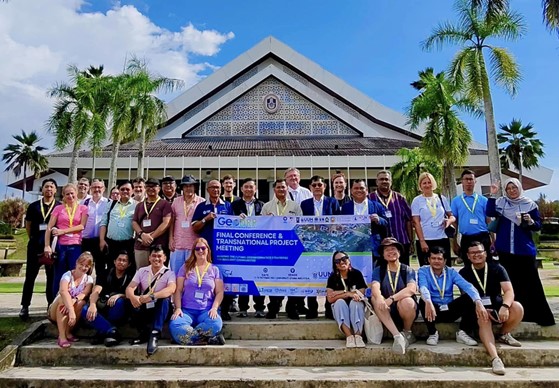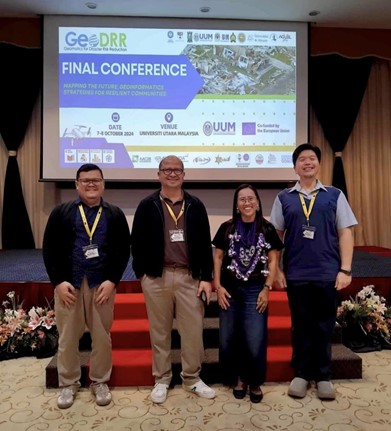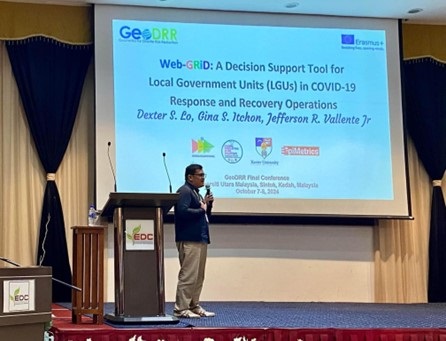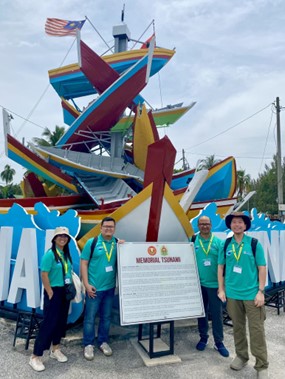From 7 to 10 October 2024, the final conference and project meeting of the Erasmus+ CBHE Geomatics for Disaster Risk Reduction (geoDRR) project took place at the EDC Hotel, Universiti Utara Malaysia (UUM), Sintok, Kedah. Attended by project partners from Cambodia, Malaysia, the Philippines, Poland, Luxembourg, Spain, and Greece, the event marked a significant milestone for the geoDRR project, promoting collaborative efforts toward enhancing disaster risk reduction strategies through geomatics.

Representing Xavier University - Ateneo de Cagayan were the project team members who are scholars and researchers in disaster risk reduction initiatives in the Philippines:

- Dr Hercules R Cascon, Project Leader of the geoDRR project at XU and Dean of the College of Engineering
- Engr Dexter S Lo, Vice-President for Social Development
- Dr Shiella C Balbutin, Director of the Office of International Cooperation and Networking (OICN) and Chair of the Development Communications Department
- EnP/Engr Jefferson R Vallente Jr, Research Coordinator of the College of Engineering
The conference provided an opportunity for the XU team to share their contributions to the GeoDRR project, alongside other international participants. A key highlight was the presentation by EnP/Engr Jefferson R Vallente Jr, who introduced their paper titled "Web-GRiD: A Decision Support Tool for Local Government Units (LGUs) in COVID-19 Response and Recovery Operations." Co-authored by Engr Dexter Lo and Dr Gina Itchon from the XU Center for Global Health, the paper demonstrated the university's leadership in applying geospatial technologies for public health and disaster response.

Developed during the height of the COVID-19 pandemic, the Web-GRiD system was a web-based GIS tool designed to support LGUs in making informed, science-based decisions regarding policies, actions, and recovery operations. The platform enabled LGUs to respond more effectively to the pandemic and was adopted by several cities and a province in the Philippines. The project, co-created with funding from the National Resilience Council of the Philippines, showcases XU’s commitment to addressing real-world challenges through innovative research.
Engr Vallente shared the highlights of the platform, saying, "The Web-GRiD project is a testament to how disaster risk reduction strategies can be applied beyond traditional natural hazards. The pandemic required us to rethink our approach to risk and resilience, and we are proud that our work has made a meaningful impact on local governments and communities."
The conference also featured an organized field visit to the Tsunami Memorial Hall in Kota Kuala Muda, where consortium members learned about Malaysia’s Tsunami Warning System, managed by METMalaysia. This visit underscored the importance of early warning systems in disaster risk reduction and provided valuable insights for the GeoDRR participants on how these systems could be integrated and enhanced within their own countries.

The GeoDRR final conference celebrated the culmination of years of collaborative research and reaffirmed the consortium’s commitment to advancing disaster risk reduction practices. The Xavier University delegation played a pivotal role in this initiative, further cementing the university’s position as a leader in disaster risk research and innovation in the country.
As the project concludes, XU is set to offer the Master of Geomatics for Disaster Risk Reduction program for the 2nd semester of 2024-2025. The shared knowledge and experiences from the GeoDRR consortium promise to influence science, policy, research, and disaster resilience strategies across participating countries for years to come.
